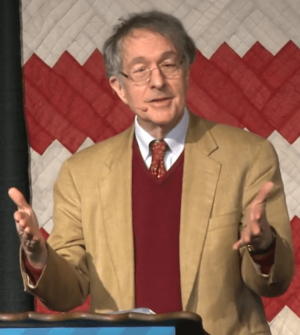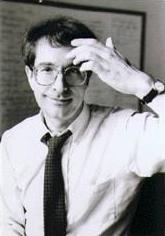Howard Gardner facts for kids
Quick facts for kids
Howard Gardner
|
|
|---|---|

Gardner in 2013
|
|
| Born |
Howard Earl Gardner
July 11, 1943 Scranton, Pennsylvania, U.S.
|
| Education | Harvard University (BA, PhD) London School of Economics |
| Known for | Theory of multiple intelligences |
| Spouse(s) | Ellen Winner |
| Scientific career | |
| Fields | Psychology, education |
| Institutions | Harvard University |
Howard Earl Gardner (born July 11, 1943) is an American developmental psychologist and the John H. and Elisabeth A. Hobbs Research Professor of Cognition and Education at Harvard University. He was a founding member of Harvard Project Zero in 1967 and held leadership roles at that research center from 1972 to 2023. Since 1995, he has been the co-director of The Good Project.
Gardner has written hundreds of research articles and over thirty books that have been translated into over thirty languages. He is best known for his theory of multiple intelligences, as outlined in his 1983 book Frames of Mind: The Theory of Multiple Intelligences.
Gardner retired from teaching in 2019. In 2020, he published his intellectual memoir A Synthesizing Mind. He continues his research and writing, including several blogs.
Early life and education
Howard Earl Gardner was born July 11, 1943, in Scranton, Pennsylvania, to Ralph Gardner and Hilde (née Weilheimer) Gardner, German Jewish immigrants who fled Germany just prior to World War II.
Gardner described himself as "a studious child who gained much pleasure from playing the piano". Although Gardner never became a professional pianist, he taught piano intermittently from 1958 to 1969.
Education was of the utmost importance in the Gardner home. While his parents had hoped that he would attend Phillips Academy in Andover, Massachusetts, Gardner opted to attend a school closer to his hometown in Pennsylvania, Wyoming Seminary. Gardner had a desire to learn and greatly excelled in school.
Gardner graduated from Harvard College with highest honors in 1965 with a BA in Social Relations, and studied under the renowned Erik Erikson. After spending one year at the London School of Economics, he went on to obtain his PhD in developmental psychology at Harvard while working with psychologists Roger Brown and Jerome Bruner, and philosopher Nelson Goodman.
Career
For his postdoctoral fellowship, Gardner worked alongside neurologist Norman Geschwind at Boston Veterans Administration Hospital and continued his work there for another 20 years. In 1986, Gardner became a professor at the Harvard Graduate School of Education. Since 1995, much of the focus of his work has been on The GoodWork Project, now part of a larger initiative known as The Good Project that encourages excellence, ethics, and engagement in work, digital life, and civic society.
In 2000, Gardner, Kurt Fischer, and their colleagues at the Harvard Graduate School of Education established the master's degree program in Mind, Brain, and Education. This program was thought to be the first of its kind around the world. Many universities in both the United States and abroad have since developed similar programs. Since then, Gardner has published books on a number of topics including Changing Minds: The Art and Science of Changing Our Own and Other People's Minds, Five Minds for the Future, Truth, Beauty and Goodness Reframed, and The App Generation (written with Katie Davis).
Since 2012, Gardner has been co-directing a major study of higher education in the United States with Wendy Fischman and several other colleagues. Information about the study, including several dozen blogs, is available on Gardner's website. In March 2022, MIT Press published Wendy Fischman and Howard Gardner's book The Real World of College: What Higher Education Is and What It Can Be.
At the start of 2024, Gardner was the most cited Educational Scholar in the United States, according to the Edu-Scholar Public Influence Ratings.
In 2024, Teachers College Press will publish two collections of Gardner’s papers: The Essential Howard Gardner on Education and The Essential Howard Gardner on Mind.
Achievements and awards
In 1981 Gardner was the recipient of a MacArthur Prize Fellowship. In 1990 he became the first American to receive the University of Louisville Grawemeyer Award in Education. In 1985, The National Psychology Awards for Excellence in the Media, awarded Gardner The Book Award for Frames of Mind: The Theory of Multiple Intelligences. In 1987, he received the William James Award from the American Psychological Association. SUNY Plattsburgh inducted Gardner selected Gardner for honoris causa membership in Omicron Delta Kappa in 1998. In 1999, Gardner received the Golden Plate Award of the American Academy of Achievement. In 2000 he received a fellowship from the John S. Guggenheim Memorial Foundation. Four years later he was named an Honorary Professor at East China Normal University in Shanghai. In the years 2005 and 2008 he was selected by Foreign Policy and Prospect magazines as one of the top 100 most influential public intellectuals in the world. In 2011, he won the Prince of Asturias Award in Social Sciences for his development of multiple intelligences theory. In 2015, he received the Brock International Prize in Education. In 2020, Gardner received the Distinguished Contributions to Research in Education Award from the American Education Research Association.
He has received honorary degrees from 31 colleges and universities around the world, including institutions in Bulgaria, Canada, Chile, Greece, Hong Kong, Ireland, Israel, Italy, South Korea, and Spain. He is also a member of several honorary societies: American Academy of Arts and Sciences, American Philosophical Society, National Academy of Education, and the American Academy of Political and Social Science.
Personal life
Howard Gardner is married to Ellen Winner, Professor Emerita of Psychology at Boston College. They have one child, Benjamin. Gardner has three children from an earlier marriage: Kerith (1969), Jay (1971), and Andrew (1976); and five grandchildren: Oscar (2005), Agnes (2011), Olivia (2015), Faye Marguerite (2016), and August Pierre (2019).
See also
 In Spanish: Howard Gardner para niños
In Spanish: Howard Gardner para niños


